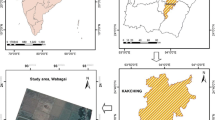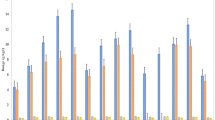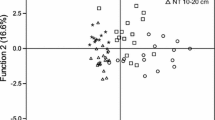Abstract
Enhancing soil organic carbon (SOC) is an important strategy to sustain and improve the soil quality, mitigate climate change and increase crop productivity under intensive tillage-based rice–wheat (RW) system in the Indo-Gangetic Plains (IGP) of South Asia. Therefore, the effects of tillage, crop establishment, and residue management practices on total as well as different pools of SOC in a sandy loam after 6 years of RW system were studied. The imposed three main plot treatments to the rice plots were: (1) ZTDSR, zero till dry seeded rice; (2) CTDSR, conventional till dry seeded rice; and (3) PTR, conventional puddled transplanted rice, and the three sub-plot treatments in succeeding wheat were (i) CTW − R, conventional tillage (CT) wheat with both rice and wheat residues removed; (ii) ZTW − R, zero tillage (ZT) wheat with both the residues removed and (iii) ZTW + R, ZT wheat with rice residue. Total soil organic content increased by 6.5–12.5% and 3.1–12.9% in different soil layers up to 0–60 cm depth in ZTDSR followed by ZTW + R over PTR followed by CTW − R practices, respectively. The corresponding increase of the oxidizable C was 4.2–28.2% and 8.2–8.5%, respectively. Significant enhancement in all the carbon pools (non-labile, less labile, labile, very labile pools, water soluble and microbial biomass carbon) and glomalin content were also recorded in ZTW + R treatment. The carbon management index was significantly higher in ZTW + R than ZTW − R and CTW − R treatments. In conservation-based agriculture systems, the principal component analysis revealed that passive pools of SOC and microbial biomass carbon were the most promising and reliable indicators for assessing soil quality. This study showed that adoption of ZTDSR followed by ZTW + R was the better crop production strategy for increasing C-sequestration, improving and sustaining the soil quality and crop productivity in the RW system. This practice also provides an opportunity to retain crop residues as an alternative to burning, which causes severe air pollution in the RW system in the IGP of South Asia.



Similar content being viewed by others
References
Abiven S, Menasseri S, Angers DA, Leterme P (2007) Dynamics of aggregate stability and biological binding during decomposition of organic materials. Eur J Soil Sci 58:239–247
Abril A, Villagra P, Noe L (2009) Spatio-temporal heterogeneity of soil fertility in the Central Monte desert (Argentina). J Arid Environ 73:901–906
Anderson DW (1979) Processes of humus formation and transformation in soils of the Canadian great plains. J Soil Sci 30:77–84
Andriulo BM, Guerif J (1999) Modelling soil carbon dynamics with various cropping sequences on the rolling pampas. Agronomie 19:365–377
Angers DA, Bolinder MA, Carter MR, Gregorich EG, Drury CF, Liang BC, Voroney RP, Simard RR, Donald RG, Beyaert RP, Martel J (1997) Impact of tillage practices on organic carbon and nitrogen storage in cool, humid soils of eastern Canada. Soil Tillage Res 41:191–201
Baker JM, Ochsner TE, Venterea RT, Griffis TJ (2007) Tillage and soil carbon sequestration—what do we really know? Agric Ecosyst Environ 118:1–5
Benbi DK, Brar JS (2009) A 25-year record of carbon sequestration and soil properties in intensive agriculture. Agron Sustain Dev 29:257–265
Bera T, Sharma S, Thind HS, Singh Y, Sidhu HS, Jat ML (2017) Soil biochemical changes at different wheat growth stages in response to conservation agriculture practices in rice-wheat system of north-western India. Soil Res 56:91–401
Bhattacharyya R, Pandey SC, Bisht JK, Bhatt JC, Gupta HS, Tuti MD, Mahanta D, Mina BL, Singh RD, Chandra S, Srivastava AK, Kundu S (2013) Tillage and irrigation effects on soil aggregation and carbon pools in the Indian sub-Himalayas. Agron J 105:101–112
Bini D, dos Santos CA, Bernal LPT, Andradea G, Nogueira A (2014) Identifying indicators of C and N cycling in a clayey Ultisol under different tillage and uses in winter. Appl Soil Ecol 76:95–101
Blair GJ, Lefroy RDB, Lisle L (1995) Soil carbon fractions based on their degree of oxidation, and the development of a carbon management index for agricultural systems. Aust J Agric Res 46:1459–1466
Borie FR, Rubio R, Morales A, Castillo C (2000) Relationships between arbuscular mycorrhizal hyphal density and glomalin production with physical and chemical characteristics of soils under no-tillage. Revista Chilena de Historia natural 73:749–756
Bronson KF, Cassman KG, Wassmann R, Olk DC, van Noordwijk M, Garrity DP (1998) Soil carbon dynamics in different cropping systems in principal eco-regions of Asia. In: Lal R, Kimble JM, Follett RF, Stewart BA (eds) Management of carbon sequestration in soil. CRC Press, Boca Raton, pp 35–57
Carranza C, Noe L, Merlo C, Ledesma M, Abril A (2012) Effect of forest clearing type on the decomposition of native and introduced pastures in the Arid Chaco, Argentina. La Revista de investigaciones agropecuarias 38:97–107
Chabbi A, Kogel-Knabner I, Rumpel C (2009) Stabilised carbon in subsoil horizons is located in spatially distinct parts of the soil profile. Soil Biol Biochem 41:256–261
Chan KY, Bowman A, Oates A (2001) Oxidizable organic carbon fractions and soil quality changes in an Oxic Paleustalf under different pasture clays. Soil Sci 166:61–67
Chen J, He F, Zhang X, Sun X, Zheng J, Zheng J (2014) Heavy metal pollution decreases microbial abundance: diversity and activity within particle-size fractions of a paddy soil. FEMS Micro Ecol 87:164–181
Choudhary M, Datta A, Jat HS, Yadav AK, Gathala MK, Sapkota TB, Das AK, Sharma PC, Jat ML, Singh R, Ladha JK (2018) Changes in soil biology under conservation agriculture based sustainable intensification of cereal systems in Indo-Gangetic Plains. Geoderma 313:193–204
Choudhury G, Bandyopadhyay S, Mallick PK, Sarkar S (2010) Soil aggregation as affected by cultivation under low and upland situations. J Indian Soc Soil Sci 58:371–375
Cornejo P, Rubio R, Castillo C, Azcón R, Borie F (2008) Mycorrhizal effectiveness on wheat nutrient acquisition in an acidic soil from southern Chile as affected by nitrogen sources. J Plant Nutr 31:1555–1569
Culman SW, Snapp SS, Freeman MA, Schipanski ME, Beniston J, Lal R et al (2012) Permanganate oxidizable carbon reflects a processed soil fraction that is sensitive to management. Soil Sci Soc Am J 76:494–504
Das TK, Bhattacharyya R, Sharma AR, Das S, Saad AA, Pathak H (2013) Impacts of conservation agriculture on total soil organic carbon retention potential under an irrigated agro-ecosystem of the western Indo-Gangetic Plains. Eur J Agron 51:34–42
Das A, Lal R, Patel DP, Idapuganti RG, Layek J, Ngachan SV, Ghosh PK, Bordoloi J, Kumar M (2014) Effects of tillage and biomass on soil quality and productivity of lowland rice cultivation by small scale farmers in North Eastern India. Soil Tillage Res 143:50–58
De Gryze S, Six J, Brits C, Merckx R (2005) A quantification of short-term macro aggregate dynamics: influences of wheat residue input and texture. Soil Biol Biochem 37:55–66
Dolan MS, Clapp CE, Allmaras RR, Baker JM, Molina JAE (2006) Soil organic carbon and nitrogen in a Minnesota soil as related to tillage: residue and nitrogen management. Soil Tillage Res 89:221–231
Du Z, Ren T, Hu C (2010) Tillage and residue removal effects on soil carbon and nitrogen storage in the North China Plain. Soil Sci Soc Am J 74:196–202
Dwivedi BS, Singh VK, Shukla AK, Meena MC (2012) Optimizing dry and wet tillage for rice on a Gangetic alluvial soil: effect on soil characteristics, water use efficiency and productivity of the rice-wheat system. Eur J Agron 43:155–165
Ernst O, Bentancur O, Borges R (2002) Decomposition of crop residues under no-till management: wheat, corn, soybeans and wheat after corn or soybeans. Agrociencia (Uruguay) 6:20–26
Franzluebbers AJ (2005) Soil organic carbon sequestration and agricultural greenhouse gas emissions in the southeastern USA. Soil Tillage Res 83:120–147
Franzluebbers AJ, Arshad MA (1997) Soil microbial biomass and mineralizable carbon of water-stable aggregates. Soil Sci Soc Am J 61:1090–1097
Gathala MK, Kanthaliya PC, Verma A, Chahar MS (2007) Effect of INM on soil properties and humus fractions in the long term fertilizer experiments. J Indian Soc Soil Sci 55:360–363
Gathala MK, Kumar V, Sharma PC, Saharawat YS, Jat HS, Singh M, Kumar A, Jat ML, Humphreys E, Sharma DK, Sharma S, Ladha JK (2013) Optimizing intensive cereal-based cropping systems addressing current and future drivers of agricultural change in the northwestern Indo-Gangetic Plains of India. Agric Ecosyst Environ 177:85–97
Ghani A, Dexter M, Perrott KW (2003) Hot-water extractable carbon in soils: a sensitive measurement for determining impacts of fertilization, grazing and cultivation. Soil Biol Biochem 35:1231–1243
Halvorson AD, Wienhold BJ, Black AL (2002) Tillage, nitrogen, and cropping system effects on soil carbon sequestration. Soil Sci Soc Am J 66:906–912
Houba VJG, van der Lee JJ, Novozamsky I (1995) Soil analysis procedures, other procedures (soil and plant analysis. Part 5B). Wageningen Agricultural University, The Netherlands
Humphreys E, Kukal SS, Christen EW, Hira GS, Singh B, Yadav S, Sharma RK (2010) Haltin the groundwater decline in north-west India: which crop technologies will be winner. Adv Agron 109:155–217
International Rice Research Institute (IRRI) (2000) IRRISTAT for window (CD-ROM) version 4.02b. IRRI, Los Banos
Jat RK, Sapkota TB, Singh RG, Jat ML, Kumar M, Gupta RK (2014) Seven years of conservation agriculture in a rice–wheat rotation of Eastern Gangetic Plains of South Asia: Yield trends and economic profitability. Field Crops Res 164:199–210
Jat ML, Dagar JC, Sapkota TB, Yadvinder-Singh, Govaerts B, Ridaura SL, Saharawat YS, Sharma RK, Tetarwal JP, Jat RK, Hobbs H, Stirling C (2016) Climate change and agriculture: adaptation strategies and mitigation opportunities for food security in south Asia and Latin America. Adv Agron. https://doi.org/10.1016/bs.agron.2015.12.005
Jat HS, Datta A, Sharma PC et al (2018) Assessing soil properties and nutrient availability under conservation agriculture practices in a reclaimed sodic soil in cereal-based systems of North-West India. Arch Agron Soil Sci 64:531–545
Jenkinson DS, Coleman K (1994) Calculating the annual input of organic matter to soil from measurements of total organic carbon and radiocarbon. Eur J Soil Sci 45:167–174
Kabir Z (2005) Tillage or no-tillage: impact on mycorrhizae. Can J Plant Sci 85:23–29
Kabir Z, O’Halloran IP, Fyles JW, Hamel C (1997) Seasonal changes of arbuscular mycorrhizal fungi as affected by tillage practices and fertilization: I. Hyphal density and mycorrhizal root colonization. Plant Soil 192:285–293
Kaiser K, Kalbitz K (2012) Cycling downwards—dissolved organic matter in soils. Soil Biol Biochem 52:29–32
Kaur T, Brar BS, Dhillon NS (2008) Soil organic matter dynamics as affected by long term use of organic and inorganic fertilizers under maize–wheat cropping system. Nutr Cycl Agroecosyt 81:59–69
Kim S, Dale BE, Jenkins R (2009) Life cycle assessment of corn grain and corn stover in the United States. Int J Life Cycle Assess 14:160–174
Knudsen D, Peterson GA, Pratt PF (1982) Lithium, sodium and potassium. In: Page AL, Miller RM, Keeney DM (eds) Methods of soil analysis part 2. Chemical and microbiological properties. Soil Science Society of America, American Society of Agronomy, Madison, pp 225–246
Ladha JK, Yadvinder-Singh, Erenstein O, Hardy B (eds) (2009) Integrated crop and resource management in the rice–wheat system of South Asia. International Rice Research Institute, Los Banos, p 395
Lal R (2004) Soil carbon sequestration impacts on global climate change and food security. Science 304:1623–1627
Lopez-Fando, Dorado CJ, Pardo MT (2007) Effects of zone-tillage in rotation with no-tillage on soil properties and crop yields in a semi-arid soil from central Spain. Soil Tillage Res 95:266–276
Loveland P, Webb J (2003) Is there a critical level of organic matter in the agricultural soils of temperate regions: a review. Soil Tillage Res 70:1–18
Lovelock CE, Wright SF, Clark DA, Ruess RW (2004) Soil stocks of glomalin produced by arbuscular mycorrhizal fungi across a tropical rain forest landscape. J Ecol 92:278–287
Mandal B, Majumder B, Bandopadhyay PK, Hazra GC, Gangopadhyay A, Samantaroy RN, Misra AK, Chowdhuri J, Saha MN, Kundu S (2007) The potential of cropping systems and soil amendments for carbon sequestration in soils under long-term experiments in subtropical India. Glob Change Biol 13:357–369
Mathew RP, Yucheng F, Githinji L, Ankumah R, Balkcom KS (2012) Impact of no-tillage and conventional tillage systems on soil microbial communities. App Environ Soil Sci. https://doi.org/10.1155/2012/548620
McGill WB, Cannon KB, Robertson JA, Cook FD (1986) Dynamics of soil microbial biomass and water-soluble organic C in Breton L after 50 years of cropping to two rotations. Can J Soil Sci 66:1–19
Olsen SR, Cole CV, Waternabe FS, Dean LA (1954) Estimation of available phosphorous in soil by extraction with sodium bicarbonate. USDA Circ 939:919
Parihar CM, Jat SL, Singh AK, Kumar B, Yadvinder-Singh, Pradhan S, Pooniya V, Dhauja A, Chaudhary V, Jat ML, Jat RK, Yadav OP (2016) Conservation agriculture in irrigated intensive maize-based systems of north-western India: effects on crop yields, water productivity and economic profitability. Field Crops Res 193:104–116
Paul EA, Collins HP, Leavitt SW (2001) Dynamics of resistant soil carbon of Midwestern agricultural soils measured by naturally occurring 14C abundance. Geoderma 104:239–256
Paustian K, Collins HP, Paul EA (1997) Management controls on soil carbon. In: Paul EA, Paustian K, Elliott ET, Cole CV (eds) Soil organic matter in temperate agroecosystems long-term experiments in North America. CRC Press, New York, pp 15–49
Reeves DW (1997) The role of soil organic matter in maintaining soil quality in continuous cropping systems. Soil Tillage Res 43:131–167
Rillig MC, Wright SF, Allen MF, Field CB (1999) Rise in carbon dioxide changes soil structure. Nature 400:628
Rillig MC, Ramsey PW, Morris S, Paul EA (2003) Glomalin, an arbuscular-mycorrhizal fungal soil protein responds to land use change. Plant Soil 253:293–299
Russell AE, Laird DA, Parkin TB, Mallarino AP (2005) Impact of nitrogen fertilization and cropping system on carbon sequestration in Midwestern Mollisols. Soil Sci Soc Am J 69:413–422
Sa JCM, Lal R (2009) Stratification ratio of soil organic matter pools as an indicator of carbon sequestration in a tillage chronosequence on a Brazilian Oxisol. Soil Tillage Res 103:46–56
Schnitzer M (1982) Organic matter characaterization. In: Page AL, Miller RH, Keeny DR (eds) Methos of soil analysis, part-2: chemical and microbiological methods. America Society Agromony, Madsion, pp 581–594
Sharma S, Kaur J, Thind HS, Yadvinder-Singh, Sharma N, Kirandip K (2015) A framework for refining soil microbial indices as bioindicators during decomposition of various organic residues in a sandy loam soil. J Appl Nat Sci 7:700–708
Sidhu HS, Manpreet-Singh, Yadvinder-Singh, Blackwell J, Humphreys E, Jat ML, Singh V (2015) Development and evaluation of the Turbo Happy Seeder for sowing wheat into heavy rice residues in NW India. Field Crops Res 184:201–212
Singh RD, Arunkumar K, Patra AK, Sahu SK, Khan MA, Bhople BS (2014) Impact of different land use management on soil enzymatic activities and bacterial genetic fingerprints of North-Western Himalayas. Curr World Environ 9:728–740
Singh VK, Yadvinder-Singh, Dwivedi BS, Singh SK, Majumdar K, Jat ML, Mishra RP, Rani M (2016) Soil physical properties, yield trends and economics after five years of conservation agriculture based rice-maize system in north-western India. Soil Tillage Res 155:133–148
Six J, Elliott ET, Paustain K (2000) Soil macroaggregate turnover and microaggregate formation: a mechanism for C sequestration under no-tillage agriculture. Soil Biol Biochem 32:2099–2103
SPSS (2014) IBM SPSS, Version 21.0, Chicago, USA
Stine MA, Weil RR (2002) The relationship between soil quality and crop productivity across three tillage systems in south central Honduras. Am J Altern Agric 17:2–8
Tiessen H, Cuevas E, Chacon P (1994) The role of soil organic matter in sustaining soil fertility. Nature 371:783–785
Tirol-Padre A, Ladha JK (2004) Assessing the reliability of permanganate-oxidizable carbon as an index of soil labile carbon. Soil Sci Soc Am J 68:969–978
Torres JLR, Pereira MG, Andrioli I, Polidoro JC, Fabian AJ (2005) Decomposição e liberação de nitrogênio a partir de resíduos de culturas de cobertura em um solo de cerrado. Revista Brasileira de Ciência do Solo 29:609–618
Vance ED, Brookes PC, Jenkinson DS (1987) An extraction method for measuring soil microbial biomass carbon. Soil Biol Biochem 19:703–707
Vaughan M, Maier R, Pryor BM (2011) Fungal communities on speleothem surfaces in Kartchner Caverns, Arizona, USA. Int J Speleol 40:65–77
Walkley AJ, Black TA (1934) An examination of the Degtjareff method for determining soil organic matter and a proposed modification of the chromic acid titration method. Soil Sci 37:29–38
Whitbread AM, Lefroy RDB, Blair GJ (1998) A survey of the impact of cropping on soil physical and chemical properties in north-western New South Wales. Aust J Soil Res 6:669–681
Wold S, Esbensen K, Geladi P (1987) Principal component analysis. Chemo Intell Lab Syst 2:37–52
Wright SF, Anderson RL (2000) Aggregates stability and glomalin in alternative crop rotations for the central Great Plains. Biol Fertil Soils 31:249–253
Wright SF, Upadhyaya A (1998) A survey of soils for aggregate stability and glomalin, a glycoprotein produced by hyphae of arbuscular mycorrhizal fungi. Plant Soil 198:97–107
Yadvinder-Singh, Sidhu HS (2014) Management of cereal crop residues for sustainable rice-wheat production system in the Indo-Gangetic plains of India. Proc Indian Natl Acad Sci 80:95–114
Yadvinder-Singh, Gupta RK, Singh J, Singh G, Singh G, Ladha JK (2010) Placement effects on rice residue decomposition and nutrient dynamics on two soil types during wheat cropping in rice–wheat system in north western India. Nutr Cycl Agroecosyst 88:471–480
Yadvinder-Singh, Thind HS, Sidhu HS (2014) Management options for rice residues for sustainable productivity of rice-wheat cropping system. J Res Punjab Agric Univ 51:209–220
Zhang Y, Zhang GQ, Tang ZH, Chen XH, Yu YS (2014) Burning straw, air pollution, and respiratory infections in China. Am J infect cont 42:81–87
Author information
Authors and Affiliations
Corresponding author
Additional information
Publisher's Note
Springer Nature remains neutral with regard to jurisdictional claims in published maps and institutional affiliations.
Electronic supplementary material
Below is the link to the electronic supplementary material.
Rights and permissions
About this article
Cite this article
Sharma, S., Thind, H.S., Yadvinder-Singh et al. Effects of crop residue retention on soil carbon pools after 6 years of rice–wheat cropping system. Environ Earth Sci 78, 296 (2019). https://doi.org/10.1007/s12665-019-8305-1
Received:
Accepted:
Published:
DOI: https://doi.org/10.1007/s12665-019-8305-1




